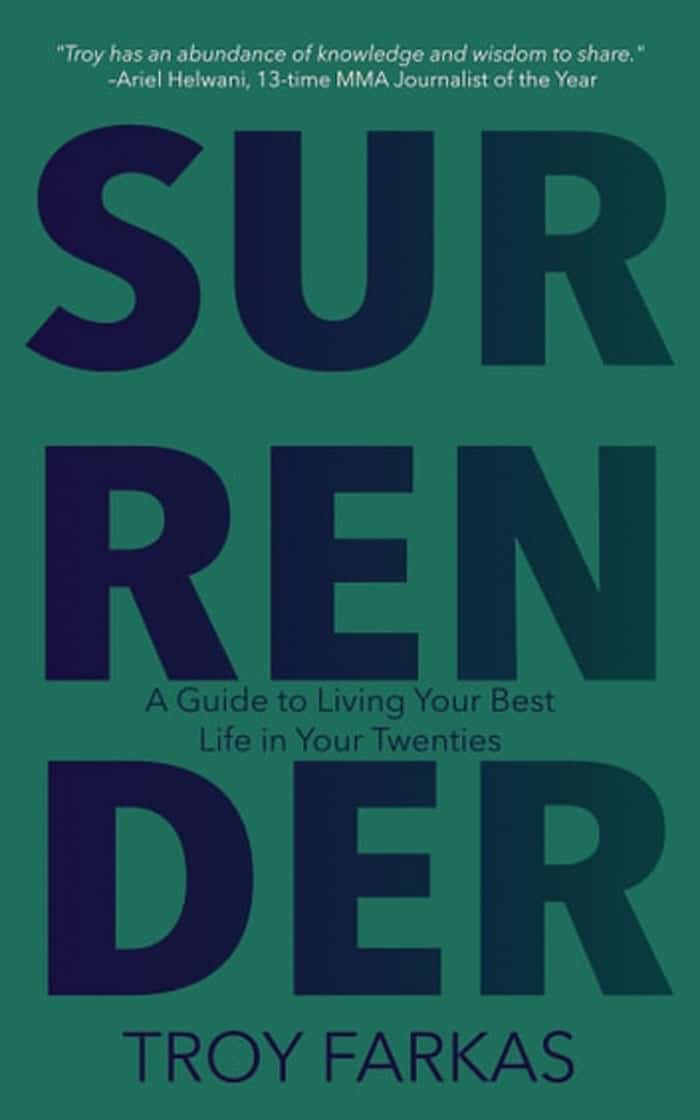
Troy Farkas thinks Tom Cruise is lying.
Well, at least his character in “Jerry Maguire,” who tells Rene Zellweger’s character: “You complete me.” Not true, according to Farkas, the author of the inspiring and practical self-help book, “Surrender: A Guide To Living Your Best Life In Your Twenties.”
“When you hear other people say it, it’s phrased as a sweet thing,” Farkas said. “It’s implying you are not whole by yourself. As someone who is single, I take pride in knowing I don’t need to get into a relationship for the sake of being in one. Some people do it because they don’t want to be alone. You should only get in a relationship when you feel like you’re ready for it. It’s not for someone else to fix you.” Farkas, 27, has been in relationships, including one with a woman who taught him “Dayenu,” but he eventually had enough of her.
Growing up, he dreamed of being on air on ESPN, but when he landed a job at ESPN radio there were overnight hours, where producers were told they would not get a chance to be on air. When ESPN got the rights to UFC, Farkas was sent to work with Ariel Helwani. Helwani, who is Jewish, has an uncanny ability to blend humor, knowledge of the fight game and a charismatic personality. The result is that the host of “The MMA Hour” has done riveting interviews with everyone from former UFC champ Conor McGregor to WWE legend Hulk Hogan, an a fairly recent humorous interview with UFC middleweight Paulo Costa, who is slated to fight undefeated Khamzat Chimaev on October 21.
Farkas said he has great gratitude for Helwani’s tutelage. “Developing a working relationship with him, it’s given me everything,” Farkas said. “Working with him has given me the ability to transform my life. He has this ethos that that whoever grinds for him, he’s going to give it back to them so he’s helped me every step of the way and that’s why I want to do to help others in my life. It’s definitely a good model to live by.”
Farkas said former UFC champ Conor McGregor is an interesting case study of someone who heroically manifested a great race to the top, but then struggled after he got there. “In the book I write that people always worry about how to get to the top, but don’t worry as much about what to do once you get there,” Farkas said. “I think Conor McGregor is a great example. He worked like hell to be great, and he got to the top and he deserves a lot of respect for being able to do that. But he’s gone downhill since then, with some questionable things. It makes me wonder should we try to be the best in our field because there could be a cost that comes with that?”
Asked if he would be the same nice guy if he earned $100 million, Farkas said he thinks he would, although he calls himself a minimalist. “Your possessions don’t say a thing about you, it’s what’s inside,” he said. “You can buy cars or yachts that give you a quick jolt, but that doesn’t change what’s inside you. I’d give money to charity and spend it on other people.”
Farkas worked producing major podcasts, including one with the host of ESPN’s “Baseball Tonight,” Buster Olney, and another with two of ESPN’s NBA Insiders, Brian Windhorst and Adrian Wojnarowski. He had the honor of working with Jewish sports journalist Jeremy Schaap as well as former WWE 24/7 Champion Peter Rosenberg. He also spent time at Spotify’s sports podcast, The Ringer.
Asked about The Nelk Boys, whose “Full Send” Podcast has taken the Internet by storm, and includes a Jewish podcaster named Steiny, Farkas said they have developed a great fan base. “They have a large following of people who just want them to be themselves, relate to them and think they’re cool, Farkas said. “They don’t know have to always ask the most journalistic questions, because that’s not why people are watching. They’re watching to see these guys be themselves with cool guests and you can see it’s working.”
The book has a number of inspiring messages, including not to waste time complaining about things that can’t be changed. “A big mistake people make is they surround themselves with negative people and it can become toxic,” he said. “If people aren’t making your life better, you have to cut them out. People are sometimes afraid and think they’re being mean, but you really have to think about doing the right thing for yourself.”
Farkas comes from a family of journalists and said that’s likely why he has a passionate curiosity about a number of topics.
Farkas comes from a family of journalists and said that’s likely why he has a passionate curiosity about a number of topics. Farkas, who gets up at 5:30 a.m. and tries to go to sleep at around 9:30 p.m. says there is a myth that if they work crazy hours, it’s something to brag about. Farkas believes this means people are often starting at their computer working too slowly or being distracted and they’d be better off resting and working productively when they’re on top of their game. “What kind of quality stuff are you doing late in the day or the night?” he asked.
 “Our addictions are so bad,” Farkas said. He writes in his book that he sees men texting at the urinal. “We can’t do our thing for 15 seconds without having to text and be on the phone.” Farkas’ good friend was killed by a distracted driver and the book is dedicated to her. “We’re so distracted jumping from thing to thing,” he said.
“Our addictions are so bad,” Farkas said. He writes in his book that he sees men texting at the urinal. “We can’t do our thing for 15 seconds without having to text and be on the phone.” Farkas’ good friend was killed by a distracted driver and the book is dedicated to her. “We’re so distracted jumping from thing to thing,” he said.
Farkas said his book is for a specific target audience. “This book is written for Gen Z,” he added. “The lesson could apply to anyone but right now, but when you’re 18-30, your brain is developing, you’re not stuck in your ways, so I want to inculcate people with good habits of exercise and the importance of friendship. If at age 50, you suddenly decide you want to start working out, it’s going to be very hard. So much of what we do is reactive, I’m trying to be preventative.” He said with the frequency of texting and social media, some in Gen Z are reluctant to approach people and talk to them. He recently got on a plane and struck up a three-hour conversation with a stranger. “I talk to people on the street, and I wonder what their story is,” he said. “I want young people to get off the phones and talk to people.”
He’s lived in Honolulu, Denver, London and Glasgow, but what matters is sharing the things you love with the people you love. “Real life is not TikTok,” he writes in the book. “Everyone wants to be big and go viral overnight,” he said. “It can happen for some people. But if you’re not authentic, it won’t be as fulfilling.” We all have the power to achieve, Farkas said, adding there are some people who have a killer instinct and some who don’t. “It’s an excuse that some people make if they say they don’t have the killer instinct,” he said. “The mind is an extremely powerful tool and weapon. What happens in the real world starts with your thoughts. How you frame things in your mind affects you.”
He writes about the problem of obesity and suggests people get into the habit of walking and doing exercise every day, as even if it is hard at first, there can be lifelong results, both physically and mentally. “We are wired to do what is comfortable,” he said. “Our ancestors were running from bears. Now, we are safe. If we’re inside, watching something, your brain is telling you you’re safe. I don’t need to stretch or work. Exercise was a part of staying alive. People ran to get food. The question now is how much do you care about your health?” People will have a smoother life if they set goals to pursue things that they love, he said. If people hate their jobs, they should quit them and find jobs they feel are meaningful to them.
“People sometime underestimate their ability to adapt and fear change,” he said. “It’s all about what makes you feel like your best authentic self.”
“Surrender” is available for pre-order and will be published August 18.






















 More news and opinions than at a Shabbat dinner, right in your inbox.
More news and opinions than at a Shabbat dinner, right in your inbox.